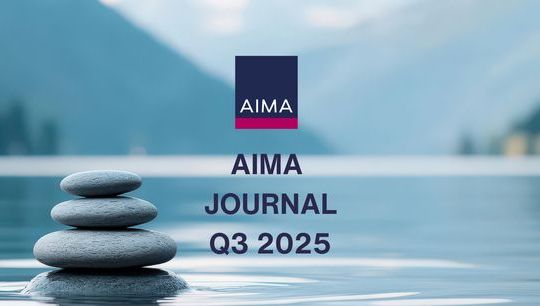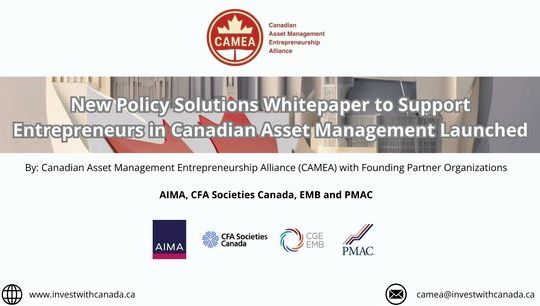Emerging Managers: Tips for remaining resilient & attracting investors
By Lawrence Obertelli, Cowen
Published: 20 September 2022
Lawrence Obertelli, Director, Prime Brokerage Sales at Cowen, discusses key findings of a joint research-based report with AIMA which highlights the increased resilience and operational efficiency gained by the global emerging hedge fund manager community as a result of the lessons learned from operating during the pandemic. Based on the results of the survey and on insight from the investor community, Lawrence Obertelli provides tips for fund managers wishing to navigate the current economic challenges and attract investors during this turbulent time.
The recently-published AIMA and Cowen report entitled ‘Emerging Stronger: The Next Generation Manager Survey 2022’ was informed by two surveys carried out in Q4 2021 and Q1 2022: one of emerging managers running up to US$500 million in assets under management (AUM), and another of the investors that allocate to them. The key findings make for interesting reading, revealing a community of hedge fund managers who have actively taken steps to cut costs in order to run lean, robust organisations. It also highlighted an investor community willing to invest in firms that are less than three years old.
The research also revealed:
- The average breakeven has fallen by 25% from its 2017 level of US$86 million in 2017 to US$64 million.
- Two-thirds of investors will consider allocating to hedge funds with less than US$100 million AUM.
- The average time to close on new investments for emerging managers is taking 6.3 months on average and even less, 5.6 months, for managers of sub-US$100 million funds.
Top tips to survive and thrive
Given the impending economic turmoil, what can fund managers learn from recent challenging times in order to remain resilient? And importantly, what steps can they take to increase their chances of securing investment? Based on the survey findings, listed on page 30 are some top-line tips for how best to survive and thrive.
- Have a plan and regularly review it. Our survey found that 61.5% of investors would block an investment if the manager had a poor business plan with unrealistic targets. So make sure you have a sound business plan. The plan will need updating regularly along the way and it is important that the changes are realistic, address the constantly evolving market conditions and remain in line with your overall strategy.
- Have a clearly defined strategy. Our joint research with AIMA highlighted that investors’ strategy preferences tend to be matched with managers, with long-short equity and multi strategy taking up a total of 62%. Standing out from the crowd with niche strategies seems to be a less common approach these days and isn’t widely sought after by investors. Avoid style-drift, as 69.2% of investors would consider this a barrier to investing.
- Embrace platforms. Regulatory hosting and structuring platforms enable firms to manage themselves at a fraction of the cost required to operate these functions fully in-house. Our joint feedback sessions with AIMA revealed the increasing adoption of such platforms with managers – and acceptance by investors. This is a trend that looks set to continue.
- Be a networker. Our survey revealed that investors’ number one source of new managers was their personal network. This was stated by around 35% of investors and highlights the importance of taking time to meet and build relationships with potential investors.
- Partner with a prime broker with cap intro services - The second most popular source for investors (23%) was prime brokerage capital introduction. This highlights the added value that a prime broker can offer. At Cowen, for example, we have a carefully selected network of differentiated investors and provide value through targeted introductions. As the majority of our team have allocator backgrounds, we can provide a high level of insight and guidance to fund managers seeking investment, and we employ rigorous analytical processes which increase the likelihood of a match.
- Think carefully about your fees. Our survey found that management fees were closely clustered, with only a small proportion of fund managers charging fees - either higher or lower - outside this cluster. The highest management fees were typically in the APAC region (1.41%), with the lowest fees in the UK (1.37%). Performance fees mirrored these regional differences, with APAC topping the chart with average performance fees of 16.6% and the UK at the lowest end with 15.8%. There seems to be a firm consensus of management fees being around 1-1.5% and performance fees of 15-17%.
- Take a ‘lower AUM for longer’ approach. Our survey revealed that 50% of managers sub US$100m are over 5 years old, compared to 38.9% in 2017. This highlights that challenges in scaling up have increased. To address this, ensure you get as much working capital as possible into the business and make it go as far as possible.
- Keep costs to a minimum. In response to challenges in scaling-up AUM, look at ways to reduce costs. Managers at our survey-feedback session referred to reducing travel costs and reviewing the office space required, with some choosing to relocate out of inner cities. Some have adopted hybrid and remote working, which have all become more mainstream as a result of the pandemic.
Outsourced solutions and platforms - which the feedback sessions highlighted are already being used by a large number of hedge funds – are increasingly being expanded in remit to include additional areas of the business, including core functions.
Emerging managers who operate lean, robust and well-planned organisations can have a bright future ahead.






